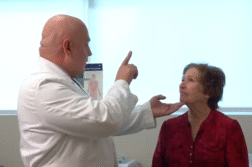Colorado (Ivanhoe Newswire) – The Alzheimer’s epidemic continues to cast a shadow over the lives of millions of people. With no effective treatment currently available, this devastating neurodegenerative disease relentlessly erodes the memories and cognitive abilities of those afflicted. Despite decades of research, we have yet to discover a cure or disease-modifying therapy that can halt its progression. But researchers believe they are closer than ever before to finding effective treatments.
John Struckhoff has watched his wife of 50 years fade away. There’s been very little help for patients like Lynn, until now.
“We’re deteriorating. I mean, we’re on a downhill slide,” John says.
University of Colorado Alzheimer’s and Cognition Center neurologist, Huntington Potter, PhD explains, “There have been several new drugs recently approved by the Food and Drug Administration for treating Alzheimer’s disease. What these do is to attack the amyloid deposits that occur in the brains of these people and reduce them and slow the decline, but they don’t reverse the disease.”
But Potter says a team at the University of Colorado found the drug called GM CSF – already approved for rheumatoid arthritis – and it actually reversed Alzheimer’s.
“Not only do they get cognitively better, but the blood biomarkers of brain damage that are used to test drugs for Alzheimer’s disease all improved,” Potter adds.
Their newest study focuses on finding drugs that block the effects of a protein known as APOE4 – a protein that significantly increases the risk of developing Alzheimer’s.
Two commonly used psychiatric drugs – imipramine and olanzapine – had a significant impact by blocking the ability of APOE4 to promote amyloid formation.
Potter says, “It isn’t just that they declined more slowly, they actually got better.”
The next step in the research — to find out how age and gender contribute to Alzheimer’s disease in hopes to develop drugs that can reverse the underlying problems.
Contributors to this news report include: Marsha Lewis, Producer; Matt Goldschmit, Videographer; Roque Correa, Editor.
To receive a free weekly e-mail on medical breakthroughs from Ivanhoe, sign up at: http://www.ivanhoe.com/ftk
Source:
https://alzres.biomedcentral.com/articles/10.1186/s13195-022-01020-9
MEDICAL BREAKTHROUGHS
RESEARCH SUMMARY
TOPIC: MIND MATTERS: PERSONALIZED DRUG COCKTAILS MAY REVERSE ALZHEIMER’S
REPORT: MB #5303
BACKGROUND: Alzheimer’s disease is a form of dementia and is also the most common. Almost six million people have Alzheimer’s in the United States, according to the CDC, and that number is expected to triple in 2060. The most common risk factor for the disease is age. Family history and genetics may also play a role in your risk for Alzheimer’s disease. Young people can develop the disease, but it is very rare.
(Source: https://www.cdc.gov/aging/aginginfo/alzheimers.htm)
DIAGNOSING: Alzheimer’s has telltale signs and symptoms that include, but aren’t limited to, repeating statements and questions over and over, forgetting conversations, getting lost in familiar places, misplacing items, changes in personality and behavior, difficulty completing familiar tasks, and decreased or poor judgment. Doctors can diagnose Alzheimer’s disease with a variety of tests. Those tests include: physical and neurological exams, lab tests, mental status neuropsychological tests, and/or brain imaging like MRIs, CT scans, and PET scans, like fluorodeoxyglucose, amyloid, and tau PET imaging.
(Sources: https://www.mayoclinic.org/diseases-conditions/alzheimers-disease/symptoms-causes/syc-20350447
https://www.cdc.gov/aging/aginginfo/alzheimers.htm
https://www.mayoclinic.org/diseases-conditions/alzheimers-disease/diagnosis-treatment/drc-20350453)
NEW TECHNOLOGY: Alzheimer’s disease treatment is not a “one-size-fits-all” approach. One neurologist, Huntington Potter, PhD, at the University of Colorado Alzheimer’s and Cognition Center, is looking into making “drug cocktails” to slow the progression, or even reverse, the disease. Potter and his research team’s focus is on finding drugs that can potentially block the effects of APOE4. Potter says, “Alzheimer’s is an equal-opportunity killer; we’re all at risk. We’re all in the same boat, and we all have to bail like mad and fix the leaks.”
(Sources: Huntington Potter, Neurologist, University of Colorado Alzheimer’s and Cognition Center
https://news.cuanschutz.edu/news-stories/dr.-potter-progress-toward-new-alzheimers-treatments)
FOR MORE INFORMATION ON THIS REPORT, PLEASE CONTACT:
Laura Kelley
If this story or any other Ivanhoe story has impacted your life or prompted you or someone you know to seek or change treatments, please let us know by contacting Marjorie Bekaert Thomas at mthomas@ivanhoe.com



